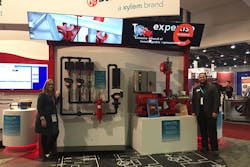Podcast: Energy & equipment challenges in HVAC & DOE regulations
Governing bodies play a key role in changes to processing facility business operations. In consideration of impending United States Department of Energy (DOE) regulation enforcement, as well as the 2017 administration change, Processing Editor in Chief Lori Ditoro sat down to discuss the role of DOE regulations role in process modification with Kyle DelPiano, Xylem Inc.’s market development manager — Southeast territory, during the 2017 AHR Show in Las Vegas. Delpiano explains the DOE motor and pump rules’ effect on the processing industries, especially HVAC, and the new U.S. administration’s potential changes to these rules.
“The industry hasn’t really gotten the chance to understand and really dig into the DOE until about last year around June…The new regulations come into effect in January 27 of 2020, so that’s three years, so manufacturers, they actually are going to have to come into compliance within a three year period, which is pretty hard to do…we took the leap of faith five years ago and redesigned all our pumps.”
DelPiano says among engineers, there are mixed actions regarding the DOE regulations, with some considering it a problem so far down the line it fails to warrant worry and others looking to get involved with meeting the requirements. He says, “It may change the pump world and how pumps are selected and what is required for, say, government facilities, shcool facilities or commercial buildings.”
Kyle DelPiano is the market development manager – Southeast territory for Xylem. He has nearly 10 years of experience in the HVAC industry and has held a variety of sales and training roles. DelPiano is LEED AP certified and is an active HIA-C and ASHRAE chapter member. He holds a Bachelors of Science degree in polymer and fiber engineering from Auburn University.
